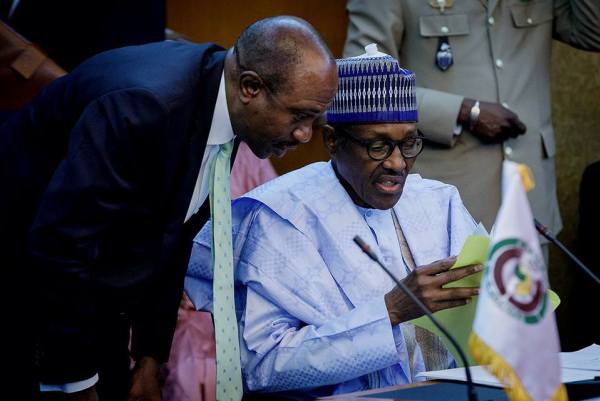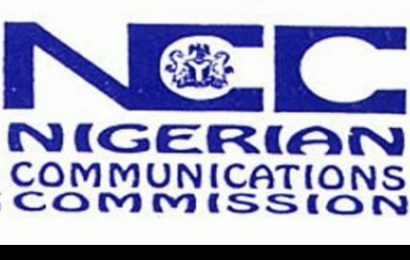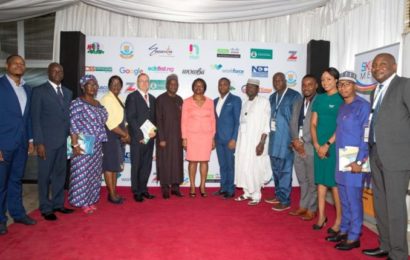
Last month a multinational banking and financial services company, the HSBC, made public its report on the future of Nigerian economy if President Muhammadu Buhari wins the 2019 presidential election. The report, compiled by its Global Research Unit, and titled, ‘Nigeria, Papering over the Cracks,’ said Nigeria’s current economic struggles would continue if Buhari wins a second term in office.
According to the financial giant, “a second term for Mr. Buhari raises the risk of limited economic progress and further fiscal deterioration, prolonging the stagnation of his first term, particularly if there is no move towards completing reform of the exchange rate system or fiscal adjustments that diversify government revenues away from oil.” It further announced that the president’s “approval ratings sit near all-time low,” courtesy of the sustained economic hardship that has accompanied his presidency, including rapidly rising joblessness, and poverty.”
Before the Presidency could find their voice on this assessment, The Economist Intelligence Unit (EIU), the research unit of The Economist, a British magazine came out directly to predict that President Buhari would lose his re-election bid to the opposition Peoples Democratic Party in 2019.
The financial institution cited as reasons for its prediction to include Buhari dwindling support in his party, the APC which has resulted in the defection of state governors and federal lawmakers to the main opposition party, the PDP; the difficult business environment that will restrict the development of non-oil exports among others.
On Saturday, September 15th, the Senior Special Assistant to the President on Media and publicity, Garba Shehu, in his usual manner, attacked the HSBC over its position, saying that the bank has no moral right to make such assessment, having “soiled its hand with ‘millions of US dollars yet-to-be-recovered Abacha loot.’”
In same manner, the ruling party described the assessment of these world giants as “doomsday prophesies” and urged “Nigerians to regard these ‘expert analyses and prophecies’ for what they are and dismiss them accordingly.”
It remains unclear if any of the President’s close allies has sat back to analyse these predictions dispassionately with a view to addressing some of the issues raised by these august institutions, instead, they are attacking the messengers as if these assessments just came from the blues – without proper research and analysis – or that votes are won through abusive words.

Let us look at the issues raised by these international institutions. It is no news that Buhari inherited an economy that was growing at the rate of seven percent annually but moved it into recession in less than two years. Experts attribute this downward slide to poor economic policies of the present administration resulting in dwindled foreign direct investments, capital flight, inflation, high interest rates, poor foreign exchange regime etc. Although our economy has exited recession but the growth rate is still below two percent per annum. Poor economy has resulted in the loss of over nine million jobs since 2015, going by the statistics released by the Nigeria Bureau of Statistics.
These nine million people who lost their jobs since 2015 are nine million votes that are most likely going to count against Buhari’s re-election in 2019. If I were Buhari or any of his acolytes, my pre-occupation now would be how to woo these population to our side before the election. I would not be doing anything that would further enlarge this pool. But these Buhari’s men would rather lie to the President and be doing those things that would create more enemies than friends for the President.
With decrease in revenue and increased cost of governance, the government cannot create a significant number of jobs but instead of encouraging the private sector to create more jobs by offering incentives that will increase their profitability, the Nigerian government seems to be trampling on the few companies that are seen to be successful through policy summersaults, high handedness of regulatory agencies, multiple taxation, extortion etc.
Let us look at the travails of MTN Nigeria, the erstwhile poster boy of FDI in Nigeria in the hands of the Buhari administration. It was fined the sum of $5.2 billion (about 1.04 trillion) for failure to deactivate about 5.1 million unregistered lines from its network. This was later reduced under controversial circumstances to N330 billion. When the company seems to have survived this issue, the CBN came calling, accusing the telecom company of illegal fund repatriation and ordering it to refund the sum of $8.1 billion.
The apex bank also fined four banks a total of N5.8 billion for “irresponsible market behaviour” in relation to the alleged illegal fund repatriation. These banks include the Standard Chartered Bank, the Citibank, Stanbic IBTC and Diamond Bank. The telecom company and the affected banks have denied any wrong doing and the matter is currently in court.
As if that was not enough, the Attorney General of the Federation, assuming the role of the Federal Inland Revenue Service (FIRS), has also ordered the same MTN to pay approximately $2 billion for alleged unpaid taxes on foreign payments and imports. The new twist to the issue that bewilders stakeholders of the sector is that the AGF has even ordered MTN Nigeria not to pay the $8.1 billion fine imposed by CBN to the apex bank but to pay it to his office
While addressing journalists on this matter at the most recent Monetary Policy Meeting (MPC) meeting, the CBN Governor, Godwin Emefiele was quoted to have said “We will resolve this matter; I’m very optimistic we’ll resolve the matter and I believe that everybody will be happy: MTN will be happy, the banks will be happy and CBN and government will be happy.”
On Thursday, 4th October, Bloomberg published a story based on documents filed by the CBN with the Federal High Court. The story alleged that the perceived softened stance by the CBN based on comments from the Governor was false and on the contrary, the apex bank was demanding 15 per cent annualised interest on the sum until the courts make a judgment, and 10 per cent from then until the whole amount is paid.
So many conflicting signals.
On Friday September 14th, operatives of the Economic and Financial Crimes Commission raided the head offices of the Standard Chartered Bank in Lagos in connection to the same alleged ‘irresponsible market behaviour’, of which the CBN has already fined and debited the bank. When the bank raised alarm and pointed towards official intimidation, the leadership of EFCC denied ordering the raid.
DSTV is battling with its regulator over its increase in subscription rates of its various bouquets. The Big Five accounting firms are still battling the Financial Reporting Council of Nigeria over the new reporting standards published by the regulatory agency. The Consumer Protection Council (CPC) and National Agency for Food and Drug Administration and Control (NAFDAC) shut Krispy Kreme’s operations over alleged use of expired products only to open it a few days later.
These are prominent players in the economy that are being hoodwinked by agents of the same Presidency that is seeking to be re-elected. A rookie analyst knows that this level of highhandedness being displayed by government agencies may shrink profitability and may result in company fold up or staff retrenchment.
If Buhari losses at the polls, if the prediction of The Economist comes to pass, it may not have come from the excellent work of the opposition but from the various government agencies that may have succeeded in de-marketing the president to the voting masses. A kingdom divided against itself can never stand.








